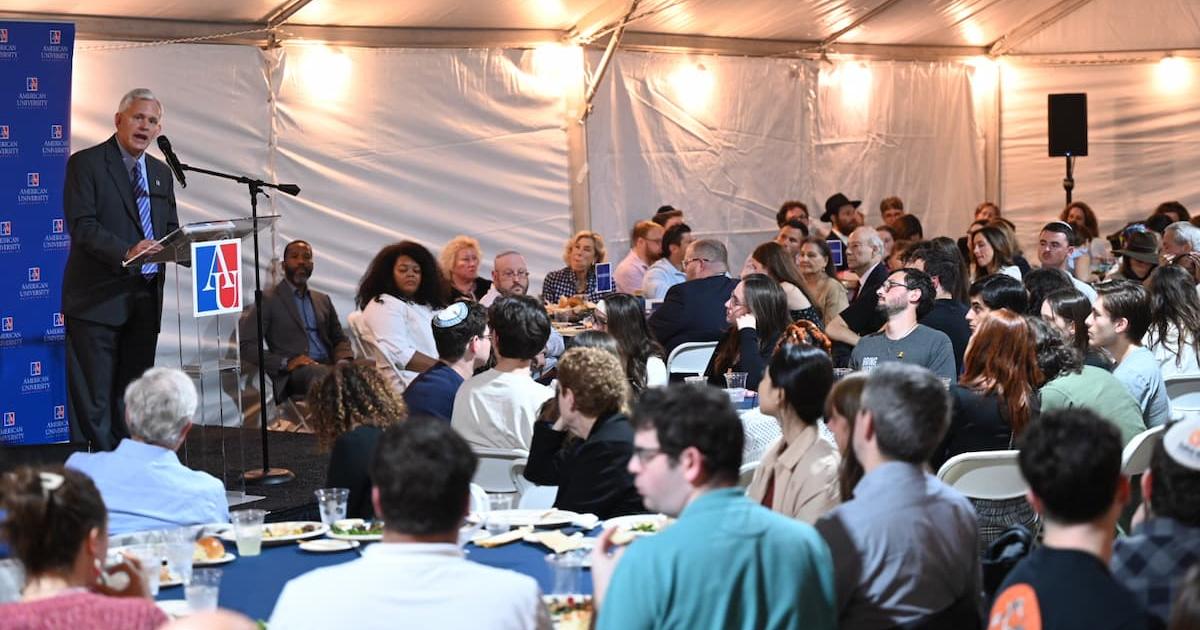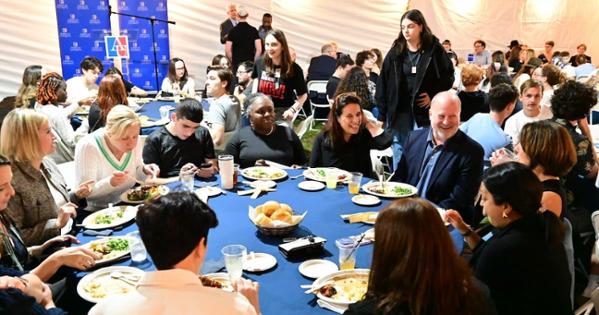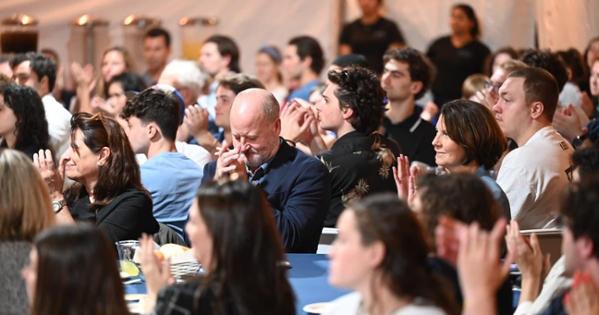Breaking Bread, Building Bridges
 On the anniversary of Hamas’s October 7 attack on Israel, about 300 American University community members gathered under a white tent on the quad and broke bread together. Over a vegetarian meal open to all, the campus community raised a glass to their shared humanity.
On the anniversary of Hamas’s October 7 attack on Israel, about 300 American University community members gathered under a white tent on the quad and broke bread together. Over a vegetarian meal open to all, the campus community raised a glass to their shared humanity.
“Food is—and has always been—a great uniter,” President Jon Alger said. “In different cultures across the century, some of our most important moments of celebration, reflection, and understanding have happened around food.”
AU’s inaugural Unity Meal was so well-attended that overflow seating had to be added on the quad. The university plans to host additional Unity Meals around the November election, Martin Luther King Jr. Day, and Inauguration Day.
 “Anthony Bourdain said, ‘Food may not be the answer to world peace, but it’s a start,’” Alger said. “I think about that tonight, as I’ve learned one of AU’s greatest strengths is that we are a community made up of many different backgrounds, lived experiences, perspectives, opinions, and ideas. But that strength needs to be thoughtfully nurtured with intentional efforts to get to know one another. In other words, to listen and to learn.”
“Anthony Bourdain said, ‘Food may not be the answer to world peace, but it’s a start,’” Alger said. “I think about that tonight, as I’ve learned one of AU’s greatest strengths is that we are a community made up of many different backgrounds, lived experiences, perspectives, opinions, and ideas. But that strength needs to be thoughtfully nurtured with intentional efforts to get to know one another. In other words, to listen and to learn.”
Alger’s remarks launched a brief program, emceed by AU men’s basketball head coach Duane Simpkins. Campus speakers reflected on the moment and how to build bridges across differences. In order of their remarks, they included:
- Nkenge Friday, vice president of inclusive excellence, spoke about looking across campus for the ties that bind us together. “Our aim is to live out our values of inclusive excellence by leading with conviction, modeling compassion, and inspiring efforts that build a better road for all of us. We gather with a mission of creating a collective connection. We gather with food as a foundational bridge. We gather to support and reflect on such a very challenging year, but with an increased understanding of the importance of moving forward together.”
- University Chaplain Rev. Eric Doolittle challenged attendees to consider how making small individual changes can contribute to the world they want to see. “I want to share two questions from my friend, the Rev. Denise Williams, who does a lot of work with people trying to find unity in places where it’s hard. What is the story you tell about the problems in our community, [and] what is the contribution you make to the very thing about which you complain? May these questions stir up untapped wisdom in your heart, pull you into hard conversations, and bolster your resolve to work on the only thing we can change in this world: ourselves.”

- AU Hillel executive director Jason Benkendorf reflected on his hope that AU will recommit to fostering a community where everyone feels safe and welcome. “We gather tonight in the spirit of unity. But unity isn’t the same as uniformity. We come tonight with different identities [and] lived experiences; we have real disagreements on matters of real consequence. Tonight is not about papering over those differences or pretending they don’t exist. Tonight is about affirming our commitment to being in community with one another across those differences.”
- SIS distinguished professor Akbar Ahmed, the Ibn Khaldun Chair of Islamic Studies, shared that seeking knowledge—a tenant of Islam—requires compassion and leads to greater understanding. “Follow knowledge like a sinking star, beyond the utmost bound of human thought,” Ahmed said, quoting Ulysses, a poem by Alfred Tennyson. “This is the spirit that must drive us in the world we are living in. Knowledge is the best beacon and light to dispel the darkness.”
